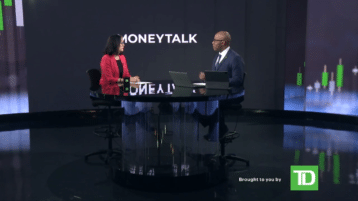Canadian home sales climbed in September for the first time in 6 months, while prices continued to accelerate. Anthony Okolie speaks with Rishi Sondhi, Economist, TD Bank, about the impact of higher average home prices in the Canadian real estate sector.
Print Transcript
After five straight monthly declines, Canadian existing home sales actually bounced back in September. Rishi, do you see, this is as the start of a modest sales upswing going forward?
Yes, I do, Anthony, but I believe the key word here is modest. We are expecting some modest growth moving forward as sales should remain at healthy levels. I'm talking about for 2022, so we expect them to be higher than they were in 2020 and 2019, but not quite as high as we saw in 2021, this year, which was an extremely robust year. And the reason why we think it'll be a modest uptick is that even though interest rates are likely to grind higher, that's when it can be counterbalanced by what we think will be strong economic growth and income growth as well. Alongside a rising population and the decision of some households to plow some of their excess savings into down payments.
OK. What about housing starts in September? What what trends are you seeing there?
Well, housing starts continue to come off the boil in September, they're moderate again. For the third quarter overall, they're down about 6% or so from their second quarter level. But the key point here is that homebuilding remains extremely healthy, just like home sales. So both home sales and starts remain at extremely healthy levels, well above what we saw prior to the pandemic. In the case of home building, it's really a function of the fact that that demand has remained pretty strong. Home prices are elevated. New inventories are low. So it's not like markets are oversupplied, which would cause homebuilders to pull back in some instances, so there's lots of supportive factors for homebuilding that's keeping that level healthy and elevated, if not as elevated as we saw earlier in the year.
And as you mentioned, home prices are still accelerating. We're still seeing a lot of demand, still chasing fewer listings. Does this demand-supply imbalance pose any risks to the real estate market in Canada?
Well, it does pose a risk in that as home prices continue to accelerate, which we think they will, we think home price growth will be stronger than home sales growth moving forward because markets are so tight. That will continue to erode affordability. So as affordability becomes eroded and prices rise further, that makes it more difficult for first time homebuyers, for example, to jump into the market. So there's some risk there as well.
OK, so what are some of the other potential headwinds that you see for the Canadian housing market going forward?
Well, one big headwind that I'll sort of expand upon is the potential for rising interest rates. It's possible because affordability has been deteriorated to such a degree during this cycle that households and Canadian home sales and housing demand in general is more sensitive to rising interest rates now than any other time in history or perhaps prior cycles. So as rates move higher, there may be a disproportionate impact on demand and prices from a normalizing interest rate environment. So that's one potential headwind that we see. Another sort of risk to the housing market stems from how quickly the Bank of Canada chooses to raise their interest rates. If they're more aggressive than we think in their interest rate campaign, that will mean rates move a little bit higher than what we expect, which would put additional downward pressure on sales and then prices compared to what we were sitting in our baseline.
Rishi, thank you very much for your insights.
Thank you, Anthony.
Yes, I do, Anthony, but I believe the key word here is modest. We are expecting some modest growth moving forward as sales should remain at healthy levels. I'm talking about for 2022, so we expect them to be higher than they were in 2020 and 2019, but not quite as high as we saw in 2021, this year, which was an extremely robust year. And the reason why we think it'll be a modest uptick is that even though interest rates are likely to grind higher, that's when it can be counterbalanced by what we think will be strong economic growth and income growth as well. Alongside a rising population and the decision of some households to plow some of their excess savings into down payments.
OK. What about housing starts in September? What what trends are you seeing there?
Well, housing starts continue to come off the boil in September, they're moderate again. For the third quarter overall, they're down about 6% or so from their second quarter level. But the key point here is that homebuilding remains extremely healthy, just like home sales. So both home sales and starts remain at extremely healthy levels, well above what we saw prior to the pandemic. In the case of home building, it's really a function of the fact that that demand has remained pretty strong. Home prices are elevated. New inventories are low. So it's not like markets are oversupplied, which would cause homebuilders to pull back in some instances, so there's lots of supportive factors for homebuilding that's keeping that level healthy and elevated, if not as elevated as we saw earlier in the year.
And as you mentioned, home prices are still accelerating. We're still seeing a lot of demand, still chasing fewer listings. Does this demand-supply imbalance pose any risks to the real estate market in Canada?
Well, it does pose a risk in that as home prices continue to accelerate, which we think they will, we think home price growth will be stronger than home sales growth moving forward because markets are so tight. That will continue to erode affordability. So as affordability becomes eroded and prices rise further, that makes it more difficult for first time homebuyers, for example, to jump into the market. So there's some risk there as well.
OK, so what are some of the other potential headwinds that you see for the Canadian housing market going forward?
Well, one big headwind that I'll sort of expand upon is the potential for rising interest rates. It's possible because affordability has been deteriorated to such a degree during this cycle that households and Canadian home sales and housing demand in general is more sensitive to rising interest rates now than any other time in history or perhaps prior cycles. So as rates move higher, there may be a disproportionate impact on demand and prices from a normalizing interest rate environment. So that's one potential headwind that we see. Another sort of risk to the housing market stems from how quickly the Bank of Canada chooses to raise their interest rates. If they're more aggressive than we think in their interest rate campaign, that will mean rates move a little bit higher than what we expect, which would put additional downward pressure on sales and then prices compared to what we were sitting in our baseline.
Rishi, thank you very much for your insights.
Thank you, Anthony.


























